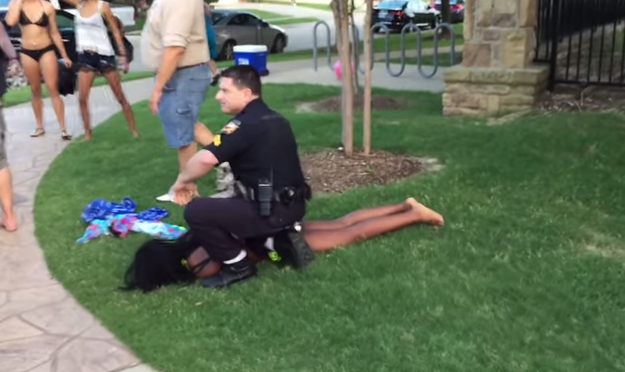We are afraid that no one will help us, that no one will ever see us as a girl worth saving.
This past weekend, many of us watched the incident in McKinney, Texas. We held our breath as a police officer grabbed a black girl in a bathing suit by her hair and sat down on her. We heard her sobbing. We watched the officer pull out his gun and point it at two boys who responded instinctively to her cries. Adults nearby did nothing. One boy who ran in fear for his life from the officer’s gun was dragged back by two policemen. We watched as he spit up blood.
And we hoped and prayed that we were not witnessing an execution.
We know the names of boys and men killed by police (or wannabe police): Tamir Rice, Michael Brown, Trayvon Martin, Akai Gurley, and Amadou Diallo. And we know that we often forget the women and girls we lose in the very same way. Rekia Boyd, Tarika Wilson, Aiyana Jones, Miriam Carey, and others melt away against the backdrop in a narrative that focuses on the ongoing clash between white and black masculinity, played out through the unrestrained violence of the state.
But I worry about the black girls who survive. I wonder about that girl, pleading and sobbing as people stand around. I am washed away in her terror, that panic that strikes you when something horrible happens in a crowd of people and no one does anything to stop it. That moment when you realize that being smaller, helpless, and in pain means so much less than you being black. Always already guilty.
I can’t stop thinking about the black girls who survive.
I think about Tamir Rice’s sister, the girl attacked by police as she tried to reach her brother as he slowly bled to death. Her brother’s killers handcuffed her and left a 12-year-old child on a cold, snowy ground to die alone. Tamir’s sister survived.
And Rachel Jeantel, who told her best friend to run away from an armed man following him in the dark. She survived.
And a tiny baby girl who watched her mother’s body get riddled with bullets from inside her car seat.
Black women and girls live in fear and unrelenting anticipation that we will be beaten on the side of a California highway, raped by police officers, handcuffed in kindergarten, and arrested for science experiments. We are scared that we might pick up a phone and learn that the man, son, or brother we love is gone. We are told our pain, in comparison to the men we love, doesn’t matter. And we risk our lives in intervening with police because we are terrified their rage will spill over to the boys and men we love.
And, still, we are afraid of being beaten by a police officer in public on a Friday summer evening on our way to the pool. We are afraid that no one will help us, that no one will ever see us as a girl worth saving. We know, too, that sometimes survival is an unspeakable burden, that the very labor of keeping our sanity and our joy is its own consuming work. And we are told how to survive because our survival is never enough.
In the protests that push against police brutality, that call attention to the regular violence and bodily harm experienced by black people in America, it will serve us to remember that the pain doesn’t end when the bullets stop firing. The trauma continues for those of us who manage to get away with our lives.
And people should remember that sometimes survival looks like a child being dragged by her hair and smashed to the ground by a man with a gun. We should remember that survival in a de facto apartheid state often doesn’t mean much at all.
Khadijah Costley White is an assistant professor in the Department of Journalism and Media Studies at Rutgers University in New Brunswick. Find her on Twitter here.
Related Links:

